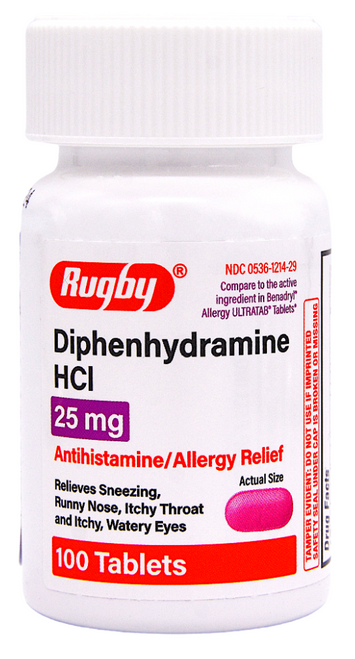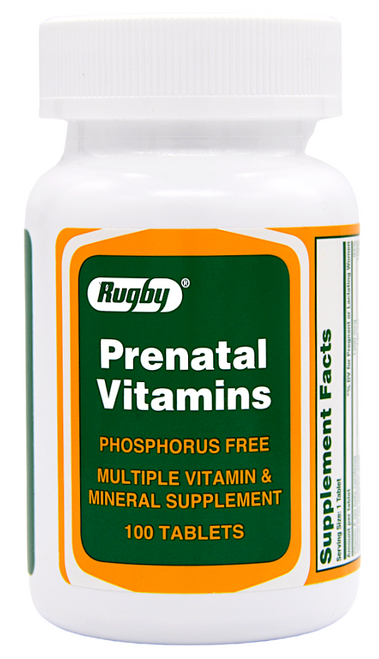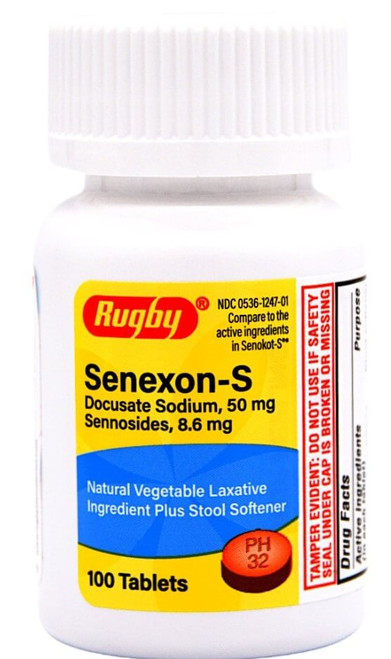Product Overview
Rugby Diphenhydramine HCl 25mg - 100 Tablets | Benadryl Ultratabs
- Compare to the active ingredient in Benadryl Allergy ULTRATAB Tablets
- Antihistamine/Allergy Relief
- Relieves sneezing
- Runny nose, Itchy throat, and itchy, watery eyes
EXPIRATION DATE: 7-2024
Ingredients
- Active: Diphenhydramine HCl 25mh - Antihistamine
- Inactive: Corn Starch, D&C Red #27 Aluminum Lake, Dibasic Calcium Phosphate Dihydrate, Magnesium Stearate, Microcrystalline Cellulose, Polyethylene Glycol, Polyvinyl Alcohol, Silicon Dioxide, Stearic Acid, Talc, Titanium Dioxide
Uses
- Temporarily relieves these symptoms due to hay fever or other respiratory allergies:
- Runny nose
- Itchy, watery eyes
- Sneezing
- Itching of the nose or throat
- Temporarily relives these symptoms due to the common cold:
- Runny nose
- Sneezing
FULL DESCRIPTION
Drug Facts
Active Ingredient
- Diphenhydramine HCl - 25mg
- Purpose: Antihistamine
Uses
- Temporarily relieves these symptoms due to hay fever or other respiratory allergies:
- Runny nose
- Itchy, watery eyes
- Sneezing
- Itching of the nose or throat
- Temporarily relives these symptoms due to the common cold:
- Runny nose
- Sneezing
Warnings
- Do Not Use
- To make a child sleepy
- With any other product containing diphenhydramine, even one used on skin
- Ask a Doctor Before Use if You Have
- A breathing problem such as emphysema or chronic bronchitis
- Glaucoma
- Difficulty in urination due to enlargement of the prostate gland
- Ask a Doctor or Pharmacist Before Use if You Are
- Taking sedatives or tranquilizers
- When Using This Product
- Marked drowsiness may occur
- Alcohol, sedatives, and tranquilizers may increase drowsiness
- Avoid alcoholic beverages
- Use caution when driving a motor vehicle or operating machinery
- Excitability may occur, especially in children
- If Pregnant or Breast-Feeding
- Ask a health professional before use
- Keep Out of Reach of Children
- In case of overdose, get medical help or contact a Poison Control Center right away
Directions
- Do not take more than directed
- Take every 4 to 6 hours, or as directed by a doctor
- Do not take more than 6 times in 24 hours
- Adults and Children 12 Years and Over
- 1 to 2 tablets
- Children 6 to 12 Years
- 1 tablet
- Children Under 6 Years
- Do not use
Other Information
- Each tablet contains: calcium 30mg
- Store at 25°C (77°F); excursions permitted between 15°-30°C (59°-86°F)
- Protect from moisture
- Use by expiration date on package
Inactive Ingredients
- Corn Starch, D&C Red #27 Aluminum Lake, Dibasic Calcium Phosphate Dihydrate, Magnesium Stearate, Microcrystalline Cellulose, Polyethylene Glycol, Polyvinyl Alcohol, Silicon Dioxide, Stearic Acid, Talc, Titanium Dioxide
Which antihistamine is the most effective?
There are several antihistamines available on the market, and the effectiveness of each can vary depending on individual factors and specific symptoms.
First-generation antihistamines, such as diphenhydramine (Benadryl) and chlorpheniramine (Chlor-Trimeton), are effective in relieving symptoms like itching, sneezing, and runny nose. However, they are known to cause drowsiness and may not be ideal for daytime use.
Second-generation antihistamines, such as cetirizine (Zyrtec), loratadine (Claritin), and fexofenadine (Allegra), are often preferred due to their non-drowsy formulations. These antihistamines are effective in treating allergy symptoms and are usually recommended for regular use.
The choice of the most effective antihistamine depends on individual factors, such as the specific allergy symptoms, personal response to the medication, and any other existing medical conditions or medications being taken. It is best to consult with a healthcare professional, such as a doctor or pharmacist, who can consider your specific situation and provide appropriate recommendations.
Does Benadryl (diphenhydramine) help with wildfire smoke?
Benadryl (diphenhydramine) is an antihistamine commonly used to relieve symptoms such as sneezing, runny nose, itching, and watery eyes associated with allergies. However, it is important to note that it is not specifically intended to alleviate the effects of wildfire smoke.
Wildfire smoke contains a complex mixture of particles, gases, and chemicals that can irritate the respiratory system and potentially cause health issues. While diphenhydramine may help reduce some allergy-related symptoms, it is not specifically designed to address the respiratory irritation caused by smoke.
If you are experiencing discomfort or respiratory symptoms due to wildfire smoke, it is recommended to take appropriate measures to reduce exposure, such as staying indoors, using air purifiers, and keeping windows closed. It is also advisable to consult with a healthcare professional for guidance on managing the effects of wildfire smoke and any related respiratory symptoms.





